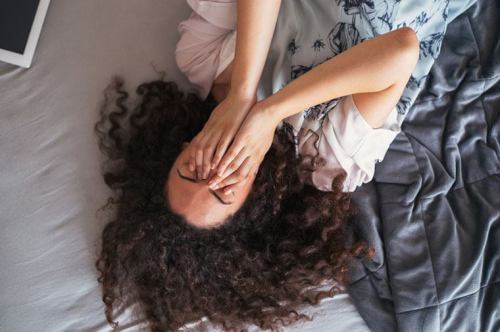Stress-related hair loss is real—and on the rise among young women
Doctors report women in their 20s and 30s are increasingly experiencing thinning hair. Here's how to treat it through self-care, supplements, and more.

When her ponytail started shrinking in circumference last summer, Lisa, an e-commerce exec in her early 30s, initially blamed it on her beauty routine. “I didn’t immediately notice that I was losing more hair in the shower or my hairbrush,” she says. “The hair-plumping shampoo I’d been loving just didn’t seem to be working the same anymore.”
But a few months later, her scalp started showing, and she had an immediate hunch that burnout was responsible for her thinning strands. “My job is extremely stressful, and I haven’t been great about keeping up with exercise as a form of stress relief,” she says.
“With severe stress, hair follicles prematurely enter a phase of growth arrest called telogen, which is shortly followed by hair loss.”
Though Lisa admits she’s been too embarrassed to tell her friends about her hair loss, she’s definitely not alone. Statistics show that 12 percent of women will have experienced abnormal hair loss by age 30, and it’s a number that doctors say is growing—in large part due to the pressures of modern life.
That’s not, however, to say that you should start building up your beanie collection just yet. Experts agree there are plenty of things that can be done to reverse the early-onset hair loss-causing cycle tension causes, and it doesn’t have to involve popping prescription drugs. Hair-lelujah!
Keep reading for more on the causes—and cures—of stress-related hair loss among women in their 20s and 30s.

The stress-tress connection
First thing’s first: If you’re experiencing unexplained hair loss, you should visit your doctor to rule out a hormone imbalance, vitamin deficiency, or genetics.
If all those tests come back clear, doctors often look at lifestyle next. “Stress—physical or emotional—puts your system in survival mode,” explains Amit Sood, MD, a Mayo Clinic stress specialist and author of The Mayo Clinic Guide to Stress-Free Living. “In this state, resources are diverted to core essential activities needed for survival and away from such activities as good skin blood flow, growth, and reproduction. With severe stress, hair follicles prematurely enter a phase of growth arrest called telogen, which is shortly followed by hair loss.”
This is true in cases of chronic stress, but isolated events can also trigger a follicular revolt. New York City-based MD Svetlana Kogan says she’s seen a uptick in young women experiencing stress hair loss since last year’s election. And Lisa says she’s noticed her hair growth seems to fluctuate in tandem with high-stress happenings.
How to get growing again
Luckily, anxiety-induced hair loss is reversible—and you can start by dialing up your self-care, says Dr. Sood.
“Focus on a healthy diet, exercise, good sleep, and relationships,” he advises. “Consider yoga, meditation, or other relaxation techniques like music, massage, coloring, gardening, or reading.”
Dr. Sood says mindfulness is also an important stress buster, and you can start by asking yourself a few simple questions: “The first step is to ask yourself, ‘Why is this situation stressful?’ Is it because you’re overcommitted, feeling you have no control, or can’t find any positive meaning in it?” he says. “Can you delegate, seek help, simplify, prioritize, better manage time and responsibilities, and connect with others? Or can you choose to accept this situation, acknowledging you’re blessed in so many other ways?” (There’s a great one-minute gratitude trick, if you need some direction.)
Anxiety-induced hair loss is reversible—and you can start by dialing up your self-care.
You can also help your body find balance through supplementation. Dr. Kogan recommends two Ayurvedic herbs, neem and brahmi. Another MD-approved supplement that addresses stress is Nutrafol, which incorporates soothing turmeric and ashwagandha. Dr. Kogan’s also a fan of bhringraj oil for hair loss, which she has clients apply topically to their hairline and temples twice daily.
And remember, patience is key. “Don’t look for a quick fix,” says Dr. Kogan. Instead, stock up on biotin-rich pumpkin seeds, draw a bath, and book a yoga class—you might just find that your hair isn’t the only thing that’s healthier in a few months’ time.
Sign Up for Our Daily Newsletter
Get all the latest in wellness, trends, food, fitness, beauty, and more delivered right to your inbox.
Got it, you've been added to our email list.








